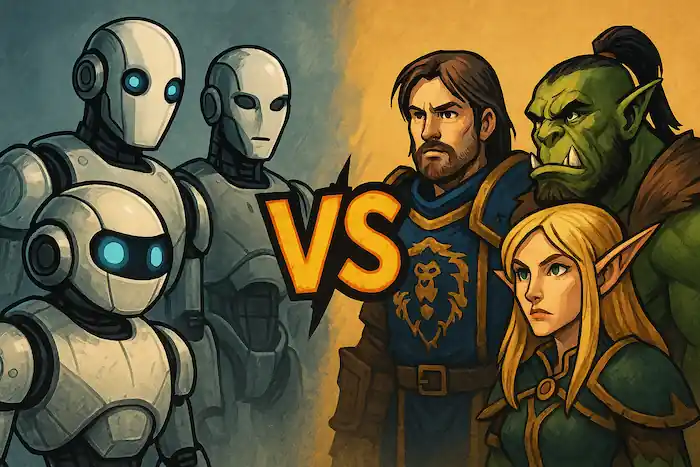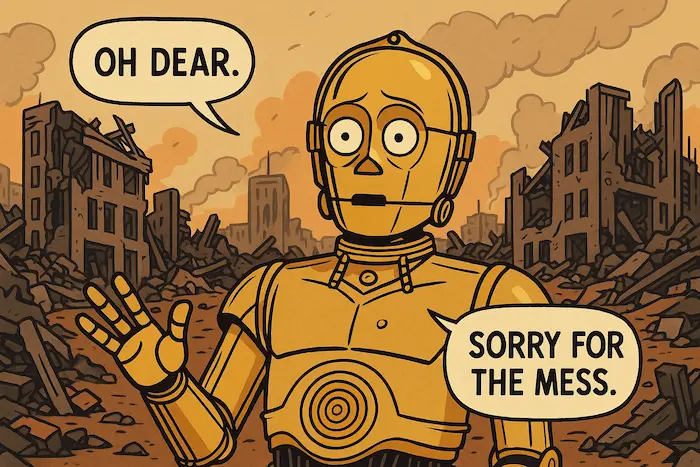I've been thinking a lot about AI since the release of ChatGPT in 2022 about how it might impact my work, my life, and the future of my children.
As I started listening to experts and diving into conversations, I kept noticing something: a striking generational divide in how people perceive AI. Those born before 1981 often see it as an exciting innovation or generally more "positive". Those after tend to be more skeptical, more cautious (both with exceptions as always).
And I started wondering: Why?
Eventually, I realized that some millennials, especially those of us who grew up online have already lived through a version of this future.
Not in the real world.
In a video game.
The digital world that raised us
I was born in the early 90'ies, right on the edge of the internet era. I grew up on strategy games and Flash websites. But in 2005, something changed. World of Warcraft launched, and it wasn't just a game it was a complete digital world much more interesting than my own at that time with at its peak more users than the entire population of Belgium.
At 15, I stepped in. I stayed for seven years.
Back then, WoW was built on principles we all intuitively understood: teamwork, dedication, communication, skill, and effort. If you wanted to survive, let alone thrive, you had to commit.
In a lot of ways, it mirrored the real world at least how the world used to work. But digital spaces evolve much faster than reality. And what happened inside WoW might just be a preview of what's unfolding now with AI…
For those who never played WoW
At its peak in 2010, World of Warcraft had over 12 million active players. You took on a unique role and worked with others to build a life in a shared, digital world.
Progress required real dedication. You gathered materials, leveled professions, joined guilds, and fought massive bosses in coordinated teams. It wasn't just about combat. It was about purpose, community, and creativity.
Back then, reaching level 60 took an average of 240 hours of play. Today? You can do it in under 8.
Sound familiar?
The parallels between WoW and AI
Here are the 7 key systems that broke down inside World of Warcraft and how they're being mirrored outside of it, in the age of AI.
1. Leveling up (learning, discipline, hard work)
Then: Leveling was a journey time-consuming, skill-based, meaningful.
Now: AI accelerates learning and execution at superhuman speed.
When WoW made leveling too fast, it lost its soul.
If AI makes skill-building obsolete, we risk disconnecting from the value of mastery, patience, and growth. Speed without struggle is empty. At some point in time we will have a generation that isn't capable of understanding anymore the things we have built, if that happens all powers hand over to its creator, in this case the few AI company's that are still in the race.
2. Professions (working, hobbies)
Then: You gathered materials, crafted gear, and sold goods in a human-driven economy.
Now: AI can write better code, generate music, do your homework, design logos, generate hollywood quality video's… instantly and more.
When bots flooded WoW's economy, professions became meaningless. Why should we spend hours grinding? Let' the bots do the boring work.
In real life, AI threatens to outpace human-made work entirely. It's not just disruption it's erasure. You already see "dark factories" and soon robot workers, it's the same thing… why should we do the "boring" work if a bot can do it for us while we are sleeping.
3. Raiding / group objectives (social skills, management, teamwork)
Then: Raids demanded trust, communication, coordination. You couldn't win alone.
Now: AI handles project planning, meeting summaries, even team strategy.
WoW eventually added "Raid Finder" tools and teamwork dissolved. In the beginning you even had to walk almost 1-2 hours to the entrance of a raid and now you are just magically teleported there.
As AI automates collaboration, we may lose the muscles we built through trial, failure, and shared effort.
In WoW one of my strengths was that I was usually the raid(team) leader. Then 15 years old, I brought together 40 people from all over the world and told them how to work together through a headset on how to defeat bosses for at least 3-6 hours per night for 2-4 weeks long just to get a 3-4 items and then do it all over again. This experience is unseen today as you can just buy the reward or send your bot today.
4. Gold (value & currency)
Then: Gold had to be earned through hard work and participation.
Now: AI lets wealth be generated algorithmically, passively, and unfairly.
When people started buying gold with real money, WoW's economy collapsed into inflation and inequality. We're watching that happen again, but this time it's real money. And real people. Quite similar with how we have crypto-miners, back then we had "Chinese farmers" playing the game day and night to get your gold.
Only the rich (not the skilled) got access to the best gear. A possible outcome for how our AI world is evolving if we don't succeed in regulating this or creating some sort of decent open source solution for everyone.
5. Roleplaying & identity (creativity)
Then: You created a character, your class, your race, your story. It was your digital self.
Now: AI generates personalities, voices, art styles, and content that mimic humanity.
WoW's roleplaying culture faded as efficiency took over. Min-maxing replaced imagination.
In real life, we're outsourcing identity itself and losing trust in what's authentic.
6. Questing (purpose)
Then: Quests gave meaning. Even small ones mattered in the larger story.
Now: AI helps us optimize everything but it can't tell us why we're doing it.
In WoW, quests became repetitive chores. The magic disappeared. And besides that they became too easy, the challenge was gone when all sorts of plugins were introduced to show you exactly where to be and what to bring without even reading the quest objective.
Life is one big quest, it's the "Ikigai (生き甲斐)" which defines us, makes us happy and gives us meaning. Don't make our Ikigai something we can do with our eyes closed, zero skills and no preparation. If the answer is not 42, it just might be finding peace in your Ikigai.
7. Plugins & addons (efficiency boosting tools)
Then: Players built tools to enhance gameplay DPS meters (damage per second), quest trackers, auction scanners. These were augmentations, not shortcuts.
Now: AI tools like ChatGPT and Copilot are doing the same boosting productivity, sharpening workflows.
But eventually, WoW's addons pushed players to play only "the best" builds, following pre-optimized "fastest" routes, and ignore everything else.
Similar to how we are all forced to use AI today, the same goes for addons in WoW, if you are not using it you are falling out of the boat. There is even an addon marketplace with more than 14.600 addons with the top 3 having a combined 1.2 billion downloads…
Today, AI risks doing the same to life.
- Resume? Automated.
- Art? Generated/Optimized.
- Decisions? Outsourced.
- Expression? Predictable.
We may optimize ourselves out of joy, out of nuance, out of freedom.
The real world is starting to feel like the endgame
People didn't leave World of Warcraft because it got harder (on the contrary).
They left because it stopped feeling like a world worth living in.
If we're not careful, AI could lead us to the same place in some way.
Automation isn't the enemy.
But disconnection is.
When we forget to reward effort, connection, and meaning, systems collapse. Whether it's a digital world or the real one.
AI can be the greatest tool we've ever created but without regulation, open access to decent solutions and affordable prices it will generate some similar effects to what we've seen.
Let's make sure we're building something worth playing.




